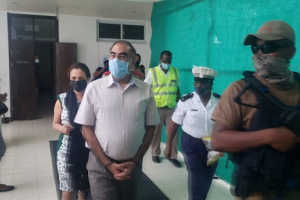Commonwealth youth development index places Seychelles 123rd globally

File Photo: A group of jubilant Seychellois youths celebrate their graduation ceremony at the University of Seychelles (UniSey) in November 2014. Education is among five categories on which countries were assessed in a newly published Youth Development Index. (Mervyn Marie, Seychelles News Agency)
(Seychelles News Agency) - A new worldwide Youth Development Index has ranked Seychelles 123rd out of 183 countries when it comes to engagement, inclusion and developing opportunities for its younger citizens.
The Commonwealth Secretariat, which published the index, is hoping to prompt policymakers to ramp up their efforts to improve the lives of nations' young people.
The index assessed countries on five categories: health and wellbeing; education; employment and opportunity; civic participation; and political participation. In total, 18 indicators were analyzed, including literacy and mental disorder rates, financial inclusion and voter engagement.
What the YDI report says
With 27 percent of Seychelles’ population classified as ‘youth’ - between the ages of 15 and 29 - the index defined the archipelago as having a ‘medium’ level of youth development.
The Indian Ocean island nation is ranked 30th overall among all 52 Commonwealth member states with an overall score of 0.518, where 1 would be a ‘perfect’ score. It was ranked 125th in health and well-being, 124th in education, 149th in employment and opportunity, 106th in civic participation and 62nd in political participation.
More than half of the Commonwealth’s 52 member countries have an overall youth development ranking of ‘medium’ or ‘low’.
After the Youth Development Index report was released last Friday, Seychellois youth ambassador Angelique Pouponneau expressed concerns about the effects of drug and alcohol addiction among the youth of Seychelles.
Pouponneau, who was last year appointed the vice chairperson for inclusion and engagement at the Commonwealth Youth Council, told SNA that one would assume that with free education and universal healthcare, Seychelles should have ranked much higher in the youth index.
“We continue to struggle with young people being affected by alcohol and drug abuse, and the prevalence of HIV and Heptatitis C for intravenous drug users and possibly for the same reason we have high youth unemployment,” she told SNA.
Another aspect she thinks may have affected the rankings could relate to political and civic contribution, pointing out that while levels of political involvement in the youth extends to social media and political rallies, young politicians were a rarity.
“Today we see one person who falls within the Commonwealth youth bracket in parliament and none in government,” she said.
Questions over data
Another area for concern is the disparity between the Human Development Index, which ranked Seychelles in 61st place globally, and the Youth Development Index placing Seychelles at 123rd place overall.
The chief executive of the Seychelles National Youth Council, Alvin Laurence, told SNA that he did not believe the result was a true representation of what he described as the ‘abundant’ opportunities available to young people in Seychelles.
“I was naturally surprised, sad and concerned to note that once again the approach taken had failed to give a true reflection of the real situation,” he said in an email interview. “We have even had academic research conducted to better understand why our lack of disaggregated data often relegate us below our real standard.”
Pouponneau agrees with Laurence that one of the problems seems to be data, which has not been broken down into age groups during collection.
“The YDI is only as good as the data that is supplied,” Pouponneau told SNA. “I feel that the Seychelles has not invested in youth disaggregated data – especially when it comes to the indicators for political participation, access to internet and volunteerism. The lesson I take from this is we seriously need to have a data revolution and disaggregate data based on age and gender.”
A ‘ticking time bomb’ for low-ranking countries
According to the YDI report, of the world’s 1.8 billion young people, 90 percent live in less developed countries, with one in three of those young people living in Commonwealth countries.
“This creates a ‘youth bulge’ that can be a demographic dividend if young people are educated and engaged and become really productive, positive citizens,” said Katherine Ellis, Director of Youth for the Commonwealth Secretariat at Friday’s launch event in London. “Or, conversely, it can become a ticking time bomb if young people are left behind and disenfranchised.”
Pouponneau doesn’t think this is necessarily the case for Seychelles, but she does think that more opportunities need to be created to meet the rising expectations of the archipelago’s young people.
“If opportunities do not continue to develop we will see more problems emerge,” she told SNA. “I do see that the disengagement can lead to social problems by more youth turning to drug abuse and crime.”
Young changemakers need more opportunities to get involved
Aside from government action, Pouponneau believes government cannot go it alone, and says that young leaders can also be instrumental to the development of the youth in Seychelles.
“I think young changemakers and influencers must be given the space to influence and inspire and have an input when it comes to government policies and legislation that affect young people. I think this is possible for Seychelles and as youth leaders come together and collaborate empowering others should be a priority on the agenda.”
According to Laurence, more resources are being allocated to youth development each year in Seychelles and this looks set to continue.
“We have already embarked on bringing policy changes, especially after completing the National Youth Survey results compilation,” he told SNA. “Those scientific findings will not only form the basis of the youth policy revision but make available a pool of data for other institutions and bodies.”
On the other hand, Laurence also concedes that in this globalized world the Seychelles needs to invest more than ever in youth development, and thinks the country would benefit from having a full-time research officer to provide continuous data about youth development.
Germany ranked highest overall in the world in the 2016 Global Youth Development Index, with Denmark and Australia following in second and third places respectively. The ten lowest ranking countries in the world were all from the sub-Saharan region.
The Indian Ocean island neighbour of Seychelles, Mauritius, ranked 69th overall, and both Kenya and South Africa ranked below Seychelles in 125th and 126th place respectively.





